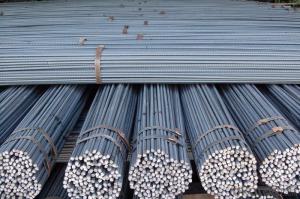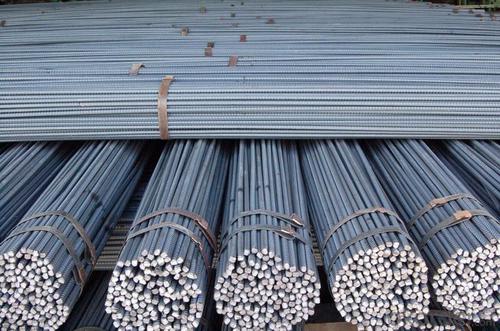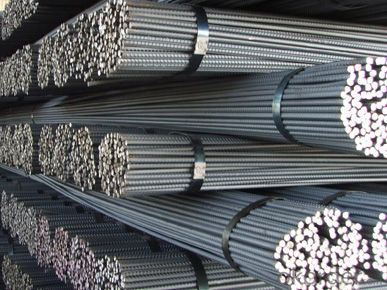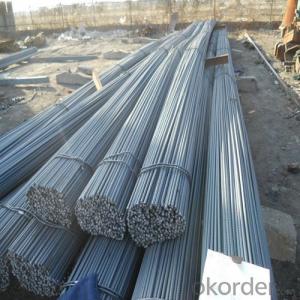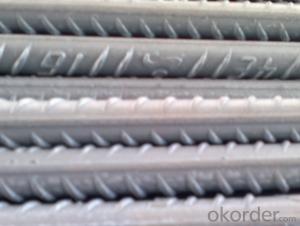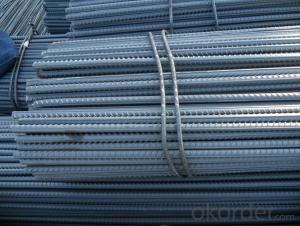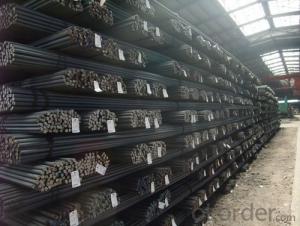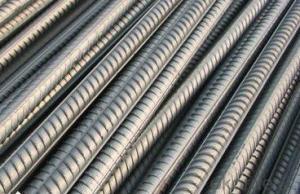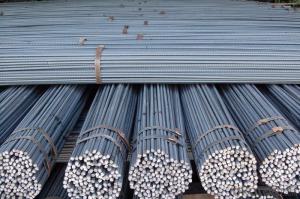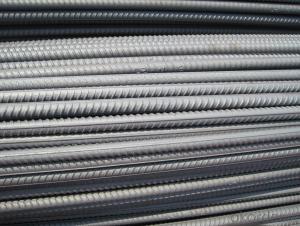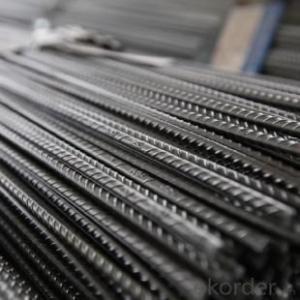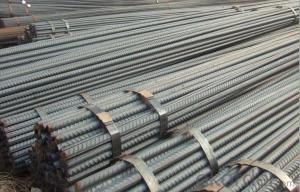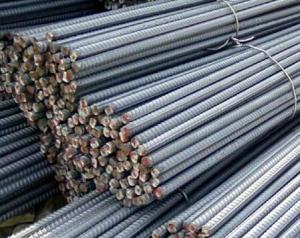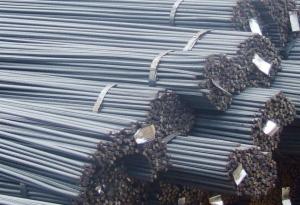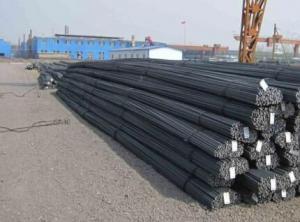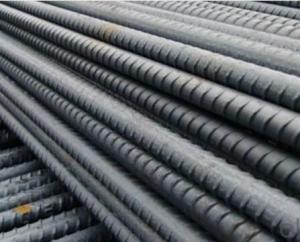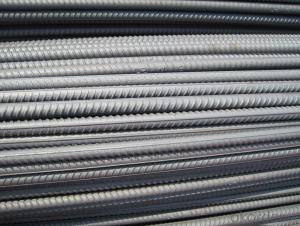GB Standard HRB400 Steel Deformed Bar 18mm/20mm
- Loading Port:
- Tianjin
- Payment Terms:
- TT or LC
- Min Order Qty:
- 50 m.t
- Supply Capability:
- 20000 m.t/month
OKorder Service Pledge
OKorder Financial Service
You Might Also Like
Steel Deformed Bar of GB Standard HRB400 Steel Deformed Bar 18mm/20mm
Description:
-Standard: GB
-Material: HRB400
-Specification:
| Diameter(mm) | Section Area(mm2) | Mass(Kg/m) | Length(m) |
| 18 | 254.5 | 2.00 | 9, 12 or as customs' request |
| 20 | 314.2 | 2.47 | 9, 12 or as customs' request |
Chemical Composition(%) of GB Standard HRB400 Steel Deformed Bar 18mm/20mm:
| C | Mn | Si | S | P | V |
| ≤0.25 | ≤1.60 | ≤0.08 | ≤0.045 | ≤0.045 | 0.04-0.12 |
Mechanical Properties of GB Standard HRB400 Steel Deformed Bar 18mm/20mm:
Yield Strength (N/cm²) | Tensile Strength (N/cm²) | Elongation (%) |
≥400 | ≥570 | ≥14 |
Usage and Applications of GB Standard HRB400 Steel Deformed Bar 18mm/20mm:
Deformed bar is widely used in buildings, bridges, roads and other engineering construction. Big to highways, railways, bridges, culverts, tunnels, public facilities such as flood control, dam, small to housing construction, beam, column, wall and the foundation of the plate, deformed bar is an integral structure material. With the development of world economy and the vigorous development of infrastructure construction, real estate, the demand for deformed bar will be larger and larger.
Packaging & Delivery of GB Standard HRB400 Steel Deformed Bar 18mm/20mm:
Packaging Detail: products are packed in bundle and then shipped by container or bulk vessel, deformed bar is usually naked strapping delivery, when storing, please pay attention to moisture proof. The performance of rust will produce adverse effect.
Each bundle weight: 2-3MT, or as required
Payment term: TT or L/C
Delivery Detail: within 45 days after received advanced payment or LC.
Label: to be specified by customer, generally, each bundle has 1-2 labels
Trade terms: FOB, CFR, CIF
Images of GB Standard HRB400 Steel Deformed Bar 18mm/20mm:
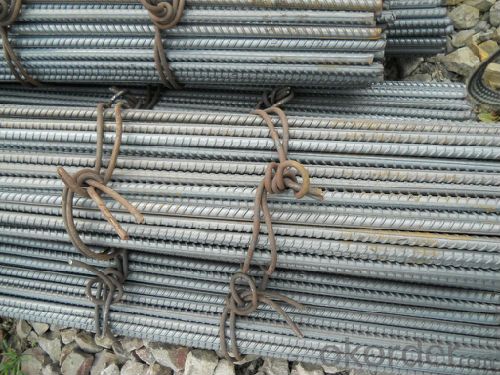
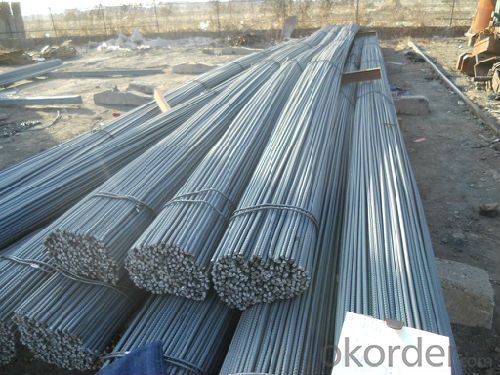
*If you would like to get our price, please inform us the size, standard/material and quantity. Thank you very much for your attention.
- Q: What are the common sizes of steel rebars?
- The common sizes of steel rebars vary depending on the application, but some of the most commonly used sizes include #3 (3/8 inch), #4 (1/2 inch), #5 (5/8 inch), #6 (3/4 inch), and #8 (1 inch).
- Q: What are the different methods of connecting steel rebars?
- There are various methods of connecting steel rebars, including lap splicing, mechanical splicing, and welding. Lap splicing involves overlapping the rebars and securing them with wire or tie bars. Mechanical splicing utilizes couplers or threaded sleeves to connect the rebars. Welding involves melting the rebars together to form a strong bond. Each method has its advantages and suitability depending on the specific requirements of the construction project.
- Q: What are the guidelines for the proper storage of steel rebars on construction sites?
- The guidelines for the proper storage of steel rebars on construction sites include keeping them in a designated area, away from moisture and dirt, stacking them horizontally and evenly, using supports or racks to prevent bending or deformation, and ensuring that they are easily accessible for use when needed. Additionally, rebars should be inspected regularly for any signs of corrosion or damage.
- Q: Can steel rebars be used in structures with limited accessibility?
- Yes, steel rebars can be used in structures with limited accessibility. Steel rebars are commonly used in reinforced concrete structures to provide strength and durability. They are versatile and can be easily transported and installed even in areas with limited accessibility. In such situations, steel rebars can be cut, bent, and assembled on-site to fit the specific requirements of the structure. Additionally, steel rebars can be prefabricated off-site and then transported to the construction site, allowing for easier handling and installation in areas with restricted access. This makes steel rebars a suitable choice for structures in remote locations or areas with limited space.
- Q: What are the factors that affect the durability of steel rebars in concrete?
- There are several factors that can affect the durability of steel rebars in concrete. These include the quality of the steel used, the level of corrosion protection provided, the design and construction practices, the exposure conditions (such as moisture and temperature), and the presence of aggressive chemicals in the surrounding environment.
- Q: What is the ductility of steel rebars?
- Steel rebars are capable of deforming and stretching without fracturing while under tension or bending, which is what ductility refers to. The excellent ductility exhibited by steel rebars enables them to effectively absorb and disperse energy when exposed to heavy loads or seismic forces. This attribute is crucial in construction as it guarantees that the rebars can endure harsh conditions while maintaining the structural integrity. Additionally, the ductility of steel rebars renders them suitable for numerous applications, including reinforcing concrete structures and providing support for buildings, bridges, and other infrastructure projects.
- Q: How are steel rebars connected to each other?
- Steel rebars are typically connected to each other using various methods such as overlapping, welding, or using mechanical connectors like couplers or threaded bars.
- Q: How many patterns are there in threaded steel?
- Rebar is ribbed steel, ribbed steel, including rebar. A ribbed steel bar with 2 longitudinal ribs and uniformly distributed ribs along the length. The transverse rib shape is helical, herringbone, crescent 3. Because of the function of rib, it has better bonding ability with concrete, so it can bear the effect of external force better.
- Q: How do steel rebars affect the overall sustainability of bridge constructions?
- The overall sustainability of bridge constructions is greatly improved by the inclusion of steel rebars. Firstly, steel rebars play a crucial role in enhancing the longevity and durability of bridges. They reinforce concrete structures, ensuring that tensile and compressive forces are evenly distributed and minimizing the risk of cracks and structural failure. This results in a longer functional lifespan for the bridge, reducing the need for frequent repairs or replacements and ultimately decreasing material consumption and waste generation. Furthermore, the sustainability of bridge constructions is further enhanced by the high recyclability of steel rebars. Once a bridge reaches the end of its life cycle, the steel rebars can be easily removed and recycled. This reduces the demand for new steel production, conserving natural resources and reducing carbon emissions associated with manufacturing processes. Additionally, the recycling of steel rebars helps mitigate the environmental impacts of mining and extraction activities. In addition, the use of steel rebars enables the design of lighter and more efficient bridge structures. Steel is known for its high strength-to-weight ratio, allowing for the creation of slender and visually appealing bridge designs. By reducing the weight of the bridge, less material is required for construction, resulting in lower energy consumption and carbon emissions during manufacturing, transportation, and construction phases. Furthermore, lighter bridge structures place less strain on the supporting foundation, reducing the need for costly reinforcement measures. In conclusion, the inclusion of steel rebars positively impacts the overall sustainability of bridge constructions in various ways. They enhance durability, reduce the need for repairs or replacements, and minimize waste generation. The recyclability of steel rebars helps conserve natural resources, reduce carbon emissions, and mitigate environmental impacts. Additionally, the use of steel rebars allows for the design of lighter and more efficient bridge structures, resulting in lower energy consumption and associated carbon emissions.
- Q: What are the guidelines for proper splicing of steel rebars in concrete structures?
- The guidelines for proper splicing of steel rebars in concrete structures are essential to ensure the structural integrity and safety of the building. Here are some key guidelines to follow: 1. Length of Lap Splicing: The length of lap splicing refers to the overlapping distance between two rebars. It is crucial to follow the specified length mentioned in the design plans or structural codes. Typically, the minimum lap length for rebars is specified as a certain multiple of their diameter, such as 40 times the diameter for tension members and 25 times the diameter for compression members. 2. Cleanliness: Before splicing the rebars, the surfaces of the bars must be cleaned thoroughly to remove any rust, scale, dirt, or other contaminants. Proper cleaning ensures a strong bond between the bars during the splicing process. 3. Proper Alignment: The rebars being spliced should be properly aligned to maintain the continuity of the reinforcement. Misalignment can lead to stress concentration, weakening the overall structure. The bars should be aligned in a straight line, ensuring that they are parallel and evenly spaced. 4. Splice Type: There are various types of splice connections available, such as lap splicing, mechanical splicing, and welded splicing. The choice of splice type should be based on the specific project requirements, structural design, and local building codes. 5. Reinforcement Bar Preparation: The rebars need to be prepared before splicing by removing any scale, rust, or other contaminants. This can be done through brushing, grinding, or shot blasting. Additionally, the ends of the rebars should be clean and free of any deformations or irregularities. 6. Testing and Inspection: It is crucial to conduct regular testing and inspection to ensure the quality and integrity of the spliced rebars. Non-destructive testing methods, such as ultrasound or magnetic particle testing, can be employed to check the bond strength and ensure the splicing has been done correctly. 7. Adequate Cover: The spliced rebars must have adequate concrete cover to protect them from corrosion and fire. The thickness of concrete cover should comply with the local building codes and design specifications. 8. Proper Grouting: If mechanical splices are used, it is important to ensure proper grouting or filling of the splice sleeve or coupler with an approved non-shrink grout. This helps in achieving full load transfer and prevents any movement or slippage of the rebars. 9. Documentation: All splicing activities should be properly documented, including the type of splice used, lap lengths, inspection reports, and any deviations from the original design. This documentation is important for future reference, maintenance, and to ensure compliance with regulatory agencies. It is important to note that these guidelines are general recommendations, and specific project requirements and local building codes should always be followed for proper splicing of steel rebars in concrete structures. Consulting with a qualified structural engineer or following the advice of a reputable construction professional is crucial to ensure the highest standards of safety and compliance.
Send your message to us
GB Standard HRB400 Steel Deformed Bar 18mm/20mm
- Loading Port:
- Tianjin
- Payment Terms:
- TT or LC
- Min Order Qty:
- 50 m.t
- Supply Capability:
- 20000 m.t/month
OKorder Service Pledge
OKorder Financial Service
Similar products
Hot products
Hot Searches
Related keywords
